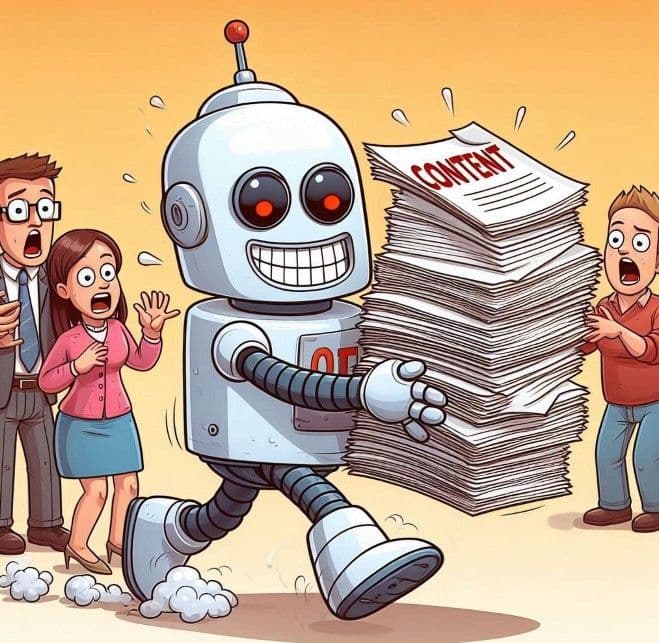BoSacks Readers Speak Out: On ChatGPT writes a B2B Newsletter, fact-checking, Dotdash Meredith, Time Inc.
By BoSacks Readers
Mon, Apr 14, 2025

Re: ChatGPT writes a B2B publishing e-newsletter
Greetings Bo, You and Greg should not publish any further AI generated content. It is pure intellectual theft and is not fair for the original creators of such content. AI has many good uses but creating content and pictures is not one of them. Having leaders in the industry publish AI generated content will encourage the rest of folks practicing journalism to do the same.
As always wishing you all the best
(Submitted by a Retired Journalism professor)
RE: Will the future of fact-checking flourish or founder? 2025 marks a new turning point
If only it always held the line on reality. I remember writing a piece for a Very Big Name. Their fact-checker told me that a quote was wrong and that I should talk to the source. I did and he said, “No, you were right, you know the topic.” So, I told the fact-checker to leave the quote as is, which the person did.
It’s not the only time I’ve seen fact-checkers make mistakes. A technical editor on one of my books was absolutely certain that I was wrong on one topic because that’s not what some documentation said. Except, if you actually tried it, like I did, the tech worked the way I described. This person was a bit stunned but admitted that my description was right.
Recently, I saw someone who is self-branded as an expert in fact-checking post something meant to be helpful that was ludicrously wrong if you read the material from the government regulators.
So, never trust that fact-checkers are something standing above everyone else. They can make mistakes and have biases. All that said, a lot of publications would find themselves less embarrassed if they employed people in the position.
(Submitted by a Freelance Writer)
RE: Dotdash Meredith and others cut ties with some freelancers and scrubbed their articles.
Another said they were told to "ghost" people rather than inform them directly of the change in strategy.
Disgusting. (Submitted by a Freelance Writer)
Re: Time Inc.’s IMPACT Center
Time Inc.’s IMPACT Center was a centralized engraving facility for all of Time Inc.’s magazines, opening in 1983, and closing in 1991. Pages were transmitted via satellite to multiple printers across America, and internationally. This was ground-breaking technology in a state-of-the-art facility—located in the basement of the Time Life Building. When Apple took over desktop publishing, pre-press was decentralized to each magazine division, negating the need for the IMPACT Center.
When IMPACT closed it produced a 16-page commemorative booklet. I wrote the introduction, reproduced here. (Submitted by a Production Person)
RE: BoSacks Speak Out: From Paste-Up to Platforms: A Production Veteran's Journey Through Publishing's Digital Revolution
This brought back many memories, you don’t hear about “moire” patterns anymore. My son is 35 and, after a dozen years selling in the transportation industry, he is actually working for Walsworth Printing. Never in my wildest dreams did I expect that to happen, but it’s funny not talking about current printing situations and your newsletter makes me realize that he missed out on a whole world of experiences. By contrast, workflows are so much simpler and actually a bit boring. I was trying to describe what used to be the best “contract” proof and went down the rabbit hole of Progs, Cromalins, and color keys and I know he thought I was nuts.
Best of success on our medical procedure, upgrading your 40 meg hard drive for an 16 gig micro SD card. (Submitted by a Printer)
Re: BoSacks Speak Out: From Paste-Up to Platforms: A Production Veteran's Journey Through Publishing's Digital Revolution
Wishing you the best outcome for your procedure and thanks for diligently creating thought-provoking content! P.S.- I recognized more than a dozen print production terms in this issue. Have I been around this business too long?
(Submitted by a Publisher)
Re: BoSacks Speak Out: From Paste-Up to Platforms: A Production Veteran's Journey Through Publishing's Digital Revolution
Hi Bob: I am wishing you good luck with your procedure…….I will be thinking about you and sending good thoughts your way.
Your daily newsletter is…..to me anyway…..like a heartbeat, pulse, and daily proof of life of our industry and its evolving nature. When your e-mails don’t arrive exactly at midnight, something is out-of-joint……I wonder if everything is OK…….with you, besides the industry. Maybe I should just go to bed earlier, but you know I won’t change at this late date.
Looking forward to your next installment after Wednesday. (Submitted by a Former Director of Manufacturing.)
Re: BoSacks Speaks Out: Children turn to audiobooks as traditional reading falls away
Hi Bo, Thanks for presenting this article about the growing impact of audiobooks on children and for your comments. If the goal of reading is only to be exposed to a story, loss of practice decoding and loss of reading skills might not be a big problem. But retaining information is enhanced by the visual process of reading and a printed artifact gives the reader a place to jot down notes, to highlight, and to review. The article briefly mentions that lack of practice decoding printed documents also creates obstacles when the reader tries to write. Without that practice, where should the writer learn the basics of spelling and punctuation?
It seems to me that graphic novels are a related problem. Young readers won't get as much practice decoding as when reading text. And, graphic novels limit the effort needed to visualize stories.
Like audio books, graphic novels can be fun and useful from time to time, but children whose literary diet consists mainly of those two formats risk missing out on the practice of decoding and imagining rapidly, which will hobble them as adults. It is saddening to realize how hard it will be for many people to read the important literary treasures of the past couple of centuries. (Submitted by an Industry Analysist)
